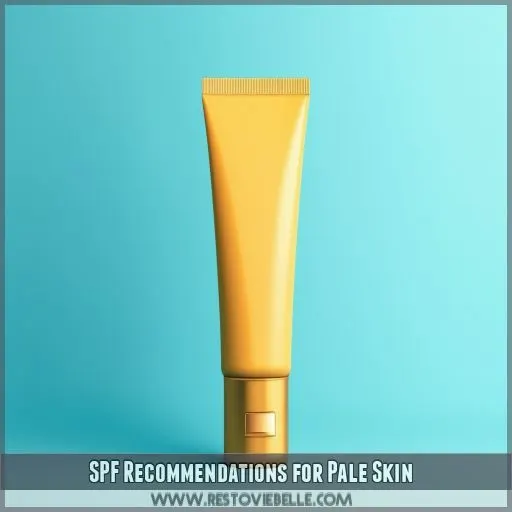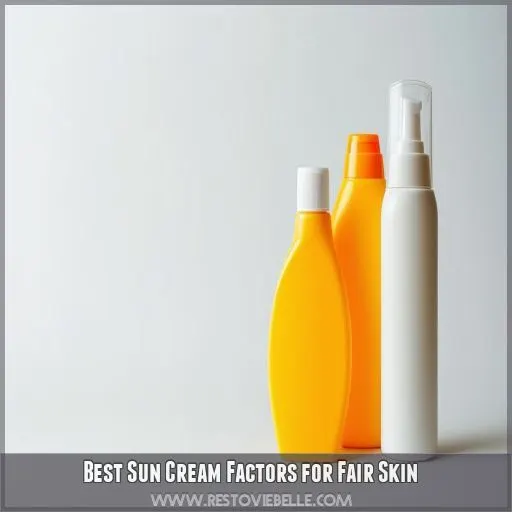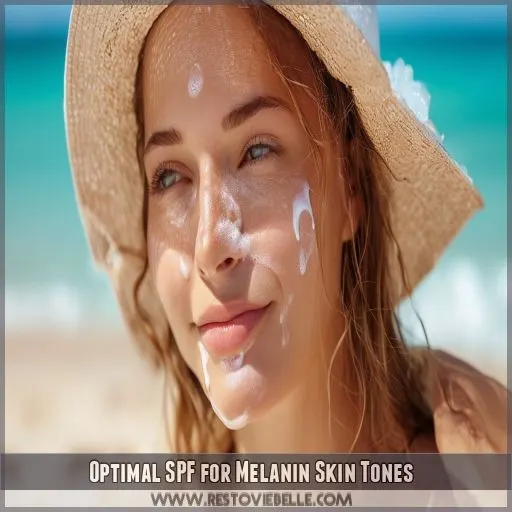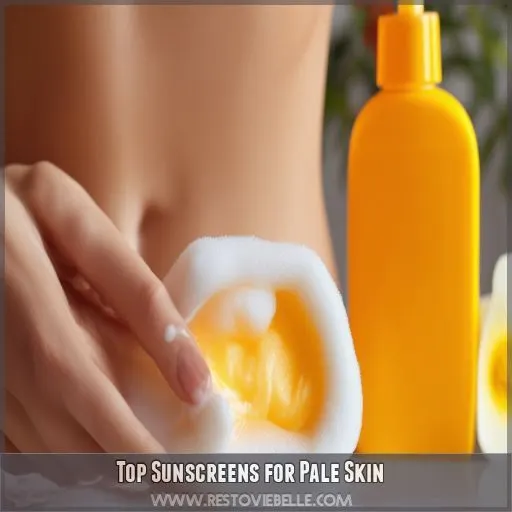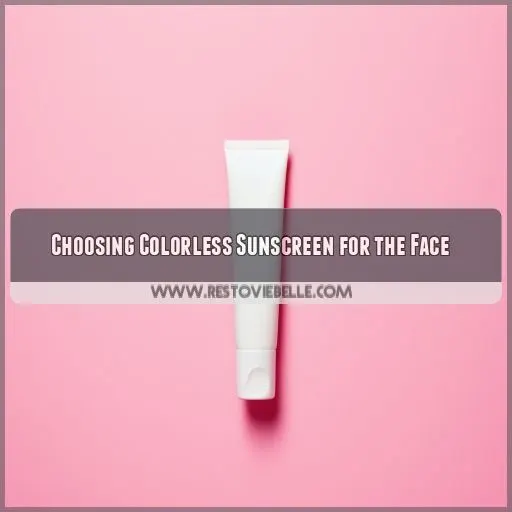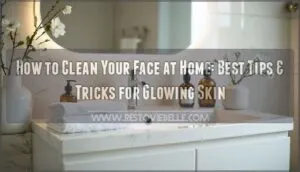This site is supported by our readers. We may earn a commission, at no cost to you, if you purchase through links.
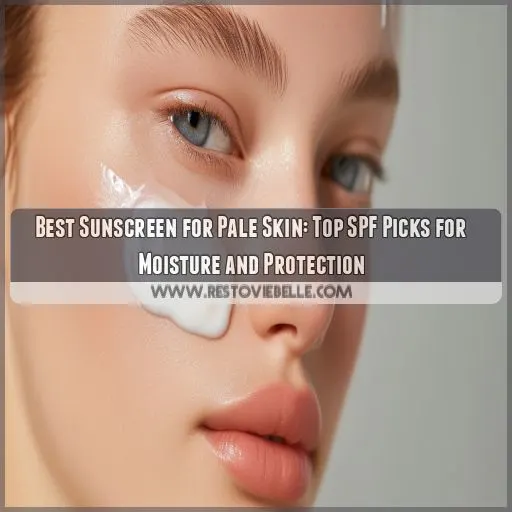 Knowing that it takes only 10 minutes for people with pale skin to burn under direct sun exposure, finding the best sunscreen for pale skin is pretty important. What you want are top SPF picks that are both moisturizing and protective.
Knowing that it takes only 10 minutes for people with pale skin to burn under direct sun exposure, finding the best sunscreen for pale skin is pretty important. What you want are top SPF picks that are both moisturizing and protective.
This guide will help you understand ideal SPF ranges, look into moisturizing formulas, and find options that leave a dewy finish.
This will include fragrance-free preferences and non-irritating ingredients to help keep that sensitive skin safe and hydrated in the sun.
Table Of Contents
- Key Takeaways
- SPF Recommendations for Pale Skin
- Best Sun Cream Factors for Fair Skin
- Optimal SPF for Melanin Skin Tones
- Top Sunscreens for Pale Skin
- Choosing Colorless Sunscreen for the Face
- Frequently Asked Questions (FAQs)
- What SPF is best for pale skin?
- What factor sun cream is best for fair skin?
- What SPF is best for melanin skin?
- What is the best sunscreen for face no color?
- How often should pale-skinned individuals reapply sunscreen indoors?
- Can pale skin develop a tolerance to sun exposure?
- Are spray sunscreens effective for fair-skinned people?
- Do pale-skinned people need sunscreen on cloudy days?
- How does medication affect sun sensitivity in pale skin?
- Conclusion
Key Takeaways
- SPF 50+ is your pale skin’s knight in shining armor, blocking 98% of those pesky UVB rays. Don’t skimp on the good stuff – your future self will thank you for keeping those vampire vibes alive and well!
- Mineral sunscreens with zinc oxide or titanium dioxide are like a force field for your delicate complexion. They sit on top of your skin, bouncing those UV rays away like a superhero deflecting laser beams.
- Fragrance-free and moisturizing formulas are your best friends in the sunscreen world. Think of them as a cool drink of water for your thirsty skin, minus the potential irritation that comes with fancy scents.
- Reapplication is key, even on cloudy days or indoors. Those sneaky UV rays are like ninjas, slipping through clouds and windows when you least expect it. Keep your sunscreen game strong, and you’ll be outsmarting the sun in no time!
SPF Recommendations for Pale Skin
If you have very fair skin, picking the suitable sunscreens is vital to avoid burns and keep safe from long-term damage.
Start with an SPF 50 sunscreen, which blocks 98% of UVB and provides robust protection; also look for "broad-spectrum," which screens both UVA and UVB rays.
Sensitive skin means you should look for a light, non-comedogenic formula which doesn’t have the potential to cause blockage, pores, or irritation.
Look for mineral sunscreens containing zinc oxide or titanium dioxide, which stay on the skin and reflect the harmful rays.
Besides, an added benefit would be to go for fragrance-free products to reduce this risk.
All of these actions will make sure your fair complexion stays safe and healthy this summer.
Best Sun Cream Factors for Fair Skin
For fair skin, opt for sunscreens with moisturizing formulas to prevent dryness and irritation. Aim for products with high SPF, ideally 50 or higher, to offer ample protection against UV rays.
Moisturizing Formulas
Moisturizing formulae in sunscreen are essential for pale skin. Non-greasy formulae provide hydration without clogging pores and are especially needed in sensitive skin solutions. Look for hypoallergenic options that offer broad protection:
- Antioxidant ingredients: Counteract free radicals.
- Mineral sunscreens: Their physical barrier action is due to zinc oxide and titanium dioxide.
- Hydrating elements: Ensuring that the skin is well nourished and protected.
Ideal SPF Ranges
To maximize protection for pale skin, aim for SPF 50 or higher. This range blocks approximately 98% of UVB rays, reducing sunburn risk. Here’s a quick reference:
| SPF Level | UVB Protection (%) | Ideal Usage |
|---|---|---|
| SPF 50+ | 98% | Everyday outdoor activity |
| SPF 60+ | 99% | Prolonged sun exposure |
Always choose fast-absorbing sunscreens for immediate protection.
Optimal SPF for Melanin Skin Tones
When choosing an SPF for melanin-rich skin tones, opt for formulas that offer a matte finish and higher SPF. Tinted sunscreens help blend seamlessly, avoiding any ashy or white cast.
Matte-Finish Preferences
Matte-finish sunscreens are popular among dark-skinned individuals due to their non-greasy feel and lack of a white cast. Opt for chemical sunscreens, which absorb well and offer effective protection. Mineral vs. chemical presents choices; mineral sunscreens are often reef-safe. Tinted moisturizers seamlessly blend while maintaining a matte-finish, ensuring a natural look without sacrificing efficacy.
Tinted Options
If one has light skin, tinted sunscreens are the best since most sunscreens protect only against sunlight and blend to avoid that white cast.
These tinted formulas help even out skin discoloration and provide under-eye protection.
Go for a broad-spectrum sunscreen that protects with zinc and ranks high in sunscreen ratings to show its effectiveness against skin cancer.
Make sure that it doesn’t irritate and is well moisturizing.
Top Sunscreens for Pale Skin
For pale skin, look for sunscreens that are dewy with a fragrance-free formula to preserve moisture without irritation. Look out for fast-absorbing, non-irritating elements.
Dewy Finish Selections
For a dewy finish on pale skin, consider these top sunscreens:
- La Roche-Posay Anthelios Melt-in Milk Sunscreen SPF 60: Lightweight, hydrating, and doesn’t contain avobenzone or oxybenzone.
- EltaMD UV Daily Broad-Spectrum SPF 40: Moisturizing, non-irritating, and includes hyaluronic acid.
- Supergoop! Glowscreen SPF 40: Provides a radiant glow, easy to apply.
- Neutrogena Hydro Boost Water Gel Lotion SPF 30: Fast-absorbing, keeps skin hydrated.
Fragrance-Free Preferences
When selecting sunscreens for pale skin, prioritize fragrance-free options to avoid irritation. Hypoallergenic, unscented formulas with lightweight textures offer sheer coverage and are non-comedogenic. For added comfort, look for aloe vera. Consider these:
| Sunscreen | Features | Ideal For |
|---|---|---|
| La Roche-Posay Anthelios | Lightweight, matte | Daily use |
| SkinCeuticals Physical | Sheer, fast-absorbing | Under makeup |
| Blue Lizard Sensitive | Natural, reef-safe | Outdoor activities |
Choosing Colorless Sunscreen for the Face
When choosing a colorless sunscreen for your pale skin, look for formulas with a dewy finish that absorb quickly into your skin. Opt for products with non-irritating ingredients to protect your sensitive complexion while providing essential sun protection.
Importance Of Dewy Finish
So, while choosing a colorless sunscreen for pale skin, don’t forget about the dewy finish. It’s not only beautiful—it enhances your look—but also signals good moisturizing properties.
Dewy sunscreen will hydrate your skin while protecting it from dangerous UVA and UVB rays.
Thus, by ensuring you’ve got protection against the sun and moisture on your skin, you’ll be avoiding two interrelated nemeses at once: skin cancer and unhealthily pale skin.
Fast-Absorbing Properties
When choosing a colorless sunscreen for your pale face, opt for fast-absorbing formulas. They’ll disappear quickly, leaving no ghostly traces.
Chemical sunscreens like Equate (Walmart) Sport Lotion SPF 50 and La Roche-Posay Anthelios Sunscreen Spray SPF 60 are champions at this. They protect from sun damage without clogging pores or causing irritation.
For a sheer application with quick dry time, these options won’t leave you hanging – or shiny!
Non-Irritating Ingredients
When choosing a colorless sunscreen for your pale, sensitive skin, opt for non-irritating ingredients. Look for hypoallergenic and non-comedogenic formulas that won’t clog pores or cause reactions.
Avoid octycrylene, which can irritate delicate skin. Instead, seek out water-light lotions with gentle, skin-protecting ingredients.
These non-irritating sunscreens will shield you from sun damage while keeping your complexion calm and clear. Remember, skin safety doesn’t have to come at the cost of comfort!
Frequently Asked Questions (FAQs)
What SPF is best for pale skin?
For pale skin, you’ll want SPF 50 or higher. It’s your best defense against sunburn and long-term damage. Don’t skimp on application – reapply every two hours. Your future self will thank you!
What factor sun cream is best for fair skin?
Just as fair skin needs extra care, you’ll want SPF 50+ for maximum protection. It’s no coincidence that higher SPF shields better against harmful rays. Opt for broad-spectrum formulas and don’t forget to reapply every two hours.
What SPF is best for melanin skin?
You will look after your skin, rich in melanin, best when you use a broad-spectrum sunscreen with an SPF of at least 30. It’ll protect you from dangerous UV rays and prevent hyperpigmentation. Reapply every two hours for excellent protection!
What is the best sunscreen for face no color?
For a colorless face sunscreen, you’ll want to opt for a broad-spectrum, mineral-based formula with SPF 30 or higher. Look for ingredients like zinc oxide or titanium dioxide, which provide effective protection without adding tint to your skin.
How often should pale-skinned individuals reapply sunscreen indoors?
Reapply every 2-3 hours or immediately after swimming or sweating. You must reapply often when spending time indoors, even if not in direct sunlight, since UV rays pass through windows and may call for particular action. And remember to reapply after washing your face!
Can pale skin develop a tolerance to sun exposure?
You can’t develop a true sun tolerance. While your skin may produce more melanin over time, it won’t fundamentally change. Always protect yourself with sunscreen, protective clothing, and limited exposure to prevent damage and reduce skin cancer risk.
Are spray sunscreens effective for fair-skinned people?
Spray sunscreens can be effective for fair skin, but you’ll need to apply them carefully. Make sure you’re using enough product and covering all exposed areas. For best protection, opt for high SPF formulas and reapply frequently.
Do pale-skinned people need sunscreen on cloudy days?
Yes, you need sunscreen on cloudy days. UV rays penetrate clouds, and your pale skin’s vulnerable. Don’t be fooled by overcast skies—they’re sneaky! Protect yourself year-round to keep your fair complexion safe and healthy.
How does medication affect sun sensitivity in pale skin?
Like a delicate flower in harsh sunlight, your pale skin can become more sensitive to UV rays when taking certain medications. You’ll need extra protection, as some drugs increase photosensitivity. Always consult your doctor about potential sun-related side effects.
Conclusion
Ah, the pale-skinned predicament: doomed to burn faster than a vampire at a tanning salon. But fear not, sun-fearing friends! You’ve now got the lowdown on the best sunscreen for pale skin.

